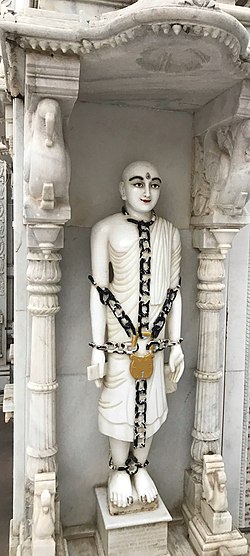Manatunga
Thank you for being part of the Bharatpedia family! 0% transparency: ₹0 raised out of ₹100,000 (0 supporter) |
This article relies largely or entirely on a single source. (January 2016) |
Manatunga | |
|---|---|
 Jain Acharya Muni Manatunga riciting Bhaktamara Stotra while being tied up under chains and 48 locks. | |
| Personal | |
| Born | 7th century CE |
| Religion | Jainism |
| Part of a series on |
| Jainism |
|---|
 |
Acharya Manatunga (c. seventh century CE) was the composer of famous Jain prayer, Bhaktamara Stotra. Acharya Manatunga is said to have composed the Bhaktamara Stotra when he was ordered to be kept in prison for not obeying the orders of King Bhoja to appear in his royal court. He was kept in the prison tied up under chains and 48 locks, and upon chanting the Bhaktamara Stotra all the 48 locks were broken and Acharya Manatunga miraculously came out of the prison.
Life[edit]
Manatunga (c. seventh century CE) was the composer of famous Jain prayer, Bhaktamara Stotra.[1][2] Acharya Manatunga is said to have composed the Bhaktamara Stotra when he was ordered to be kept in prison for not obeying the orders of King Bhoja to appear in his royal court. He was kept in the prison tied up under chains and 48 locks, and upon chanting the Bhaktamara Stotra all the 48 locks were broken and Acharya Manatunga miraculously came out of the prison after attaining self realization.[citation needed]
References[edit]
Citations[edit]
- ↑ Vijay K. Jain 2013, p. 193.
- ↑ Vijay K. Jain 2012, p. xi.
Sources[edit]
- Jain, Vijay K. (2012), Acharya Amritchandra's Purushartha Siddhyupaya: Realization of the Pure Self, With Hindi and English Translation, Vikalp Printers, ISBN 978-81-903639-4-5,
 This article incorporates text from this source, which is in the public domain.
This article incorporates text from this source, which is in the public domain. - Jain, Vijay K. (2013), Ācārya Nemichandra's Dravyasaṃgraha, Vikalp Printers, ISBN 9788190363952,
 This article incorporates text from this source, which is in the public domain.
This article incorporates text from this source, which is in the public domain.
External links[edit]

